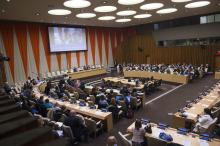Rohingya crisis: UNICEF issues 'Child Alert,' outlines urgent action to save lives
20 October 2017 – Issuing a dire warning on the desperate situation of Rohingya refugee children, who now number more than 320,000 in Bangladesh, the United Nations Children's Fund (UNICEF) has called for an end to the atrocities targeting civilians in Myanmar's Rakhine state, and immediate and unfettered access to all children affected by the violence there.
UNICEF warns of nutrition crisis affecting 165,000 children in Mali
9 October 2017 – A nutrition crisis, exacerbated by continuing violence, instability and displacement, is threatening the lives and futures of thousands of children in Mali, the United Nations Children's Fund (UNICEF) warned today.
A report published today shows that an estimated 165,000 children are expected to suffer from severe acute malnutrition across the country in 2018.
UNICEF: Decades of progress for children at risk across Middle East and North Africa
11 September 2017 – Nearly one-in-five children across the Middle East and North Africa – over 90 per cent of whom live in conflict-affected countries – need immediate humanitarian assistance, according to new analysis by the United Nations Children's Fund (UNICEF).
Conflict continues to rob millions of girls and boys of their childhood, said Geert Cappelaere, UNICEF Regional Director, in a press statement.
Youth Voices on Substance Abuse: A Guide to Empowerment and Action
18 August 2017 - The Youth Voices on Substance Abuse: A Guide to Empowerment and Action program engaged over one hundred upstate New York high school students in studies of key human rights documents, like the Universal Declaration of Human Rights and the Sustainable Development Goals, followed by readings and classroom discussions exploring the causes and results of potentially addictive substance use.
Health services, especially vaccines, must 'reach the unreached,' stress UN agencies
Globally, nearly 13 million infants – almost one in ten – did not receive any vaccinations last year, putting them at serious risk of potentially fatal diseases, the United Nations Children's Fund (UNICEF) and the World Health Organization (WHO) said today, urging greater efforts to extend the reach of health services.
Yoga is Always There with You: Conversation on Yoga for Health
Yoga is about our ability to feel yoga in our souls, to connect it to our minds and to integrate […] with nature and the planet—so Dr. Nata Menabde, Executive Director of the New York office of the World Health Organization (WHO) in her opening remarks to the Conversation on Yoga for Health held on 21 June 2017 at United Nations Headquarters in New York.
Do Yoga, Be Yoga and Enjoy Your Life!
It has been a long time since the North Lawn garden of the United Nations in New York has been used, due to the eight-year renovation of the Secretariat building and grounds, but something of its intended natural life finally returned to the green space yesterday, 20 June 2017: the Permanent Mission of India to the United Nations had invited yogis from all walks of life to a yoga session in celebration of the third International Day of Yoga.
Tobacco's killer toxins also wreak havoc on the environment, UN health agency warns
Stamping out tobacco use can save millions of lives and combat poverty, the World Health Organization (WHO) said today and spotlighted for the first time the ways in which tobacco affects human well-being from an environmental perspective – caused by production, distribution and waste.
UN calls for recognizing the rights of people with autism to make their own decisions
Ahead of World Autism Awareness Day, the United Nations today called for recognizing the rights of people with the spectrum neurological condition, which is believed to affect 70 million people around the world.
Polluted environments kill 1.7 million children each year, UN health agency reports
6 March 2017 – Unhealthy environments are responsible for one-quarter of young child deaths, according to two new reports from the United Nations health agency, which reviewed the threats from pollutants such as second-hand smoke, UV radiation, unsafe water and e-waste.
According to the latest information, polluted environments take the lives of 1.7 million children under the age of five.










